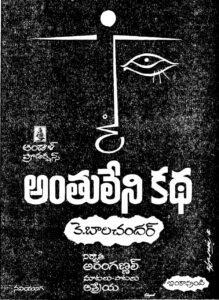Kumari Srimathi, Is Definitely Not One Among You!
Review by Kausalya Suharika R
Kumari and Srimathi may not be uncommon names in India, but what adds a whimsical twist is the pairing of these two names for a woman’s first and middle names. Enter our protagonist, Itikelapudi Kumari Srimathi, affectionately known as Siri. If you’ve ever delved into Indian movies of the 1980s, you’d recognize a recurring theme. Typically centered around a male hero, these films revolve around the protagonist’s relentless pursuit of family happiness, navigating challenges, be they climbing mountains or crossing oceans. Often portrayed as a gullible or virtuous “Rama is a good boy” character, the hero unwittingly falls into the snares set by the antagonist or ‘villain.’ The crux of the plot lies in the hero’s triumphant escape from these traps, emerging victorious to provide for his family. Female leads play supporting roles, and the ultimate resolution sees the hero’s happiness mirrored in his family’s joy, celebrating the age-old triumph of good over evil.

Imagine the same narrative with a female protagonist taking the helm, reminiscent of the journey portrayed in the film ‘Anthuleni Katha,’ starring Ms. Jayaprada and directed by K. Balachander. The entire storyline underscores the gender-specific challenges faced by the protagonist, emphasizing her status as a woman and the myriad limitations she encounters. She grapples with criticisms and disappointments, particularly from her own mother, who questions her ability to lead the family on her terms simply because she is a woman. Amidst numerous conflicts within and outside the family, our heroine resiliently confronts life’s challenges, exerting every ounce of strength to secure a better future for her loved ones.
Despite her unwavering determination, the heroine remains unappreciated by both, her family and the external world. Internally, she battles depression, yet outwardly, she presents a facade of strength to the world. In the culmination of her struggles, she finds herself isolated, leading an independent life devoid of the support and recognition she sought.
Same stories, different journeys and different endings, the output of the story is completely based on gender.
I’m glad that these stories belonged in the past. Past is passed, it’s over. Let’s move on to the updated version of the world, shall we?

Kumari Srimathi stands as a resilient and independent woman. Despite a sweet romantic history, she never let it define her. Her sole passion and life goal revolve around reclaiming the house she promised her grandfather she would safeguard at all costs. Raised in the absence of her father and with a mother facing challenges, she pursued education in hotel management. Unfortunately, this path didn’t yield sufficient income to meet their needs or to resolve the legal tangle surrounding their ancestral house—a case initiated by her own uncle.
The uncle who once cherished her during her childhood becomes her adversary in adulthood, particularly regarding ownership of the family home. Almost everyone, with only some exceptions like her grandmother, incessantly nags Srimathi about her age and the perceived delay in getting married. Her mother is a character marked by perpetual disappointment in her eldest daughter for not conforming to the societal expectations of marrying within the prescribed age for girls.
Despite the constant pressure and societal norms, Srimathi, who dislikes receiving the customary blessing “Seeghra meva kalyana prapthirasthu”, grapples daily to lead a peaceful life, driven by her ultimate objective of reclaiming her ancestral house. As a small-town girl with modest income, Srimathi aspires for significant achievements, relying solely on her self-confidence as her capital—an assurance instilled in her by her neighbor and confidant, Jakkampudi Sriram.
The narrative encompasses sub-stories detailing how she secures financial support and the conflicts arising in the village due to her new business ventures.
Coming to her business venture in Ramaraju Lanka, Srimathi observes a recurring sight of inebriated individuals during her daily commute between work and home. These individuals travel to nearby villages to indulge in alcohol consumption. Reflecting on this situation, Srimathi arrives at the conclusion that establishing the first-ever bar and restaurant in her village could serve as a comprehensive solution to various challenges she faces. The series delves into societal taboos, addressing issues such as gender bias, societal pressures related to marriage for women, and the unfortunate acceptance of domestic violence by wives of alcoholic husbands. Alongside the charming narration of Srimathi’s love story, the plot also introduces some unexpected and darker twists that captivate the audience. The comedy element is exceptional, skillfully balancing the narrative with the storyline.
The web series endeavors to break free from traditional patriarchal norms that dictate how women should conform or defy societal expectations, doing so with a subtle yet impactful enlightenment. It follows the journey of a woman from a village in East Godavari who defies conventions by venturing beyond traditional roles, establishing a bar and restaurant with the aim of reclaiming her ancestral house through the profits. The overarching narrative itself resonates strongly, signaling that it is crucial to transcend and eliminate gender biases in our present era.
Thiruveer and Sriram portray the love interests in the story, with Thiruveer being the one Srimathi is fond of, and Sriram being the one who harbors feelings for Srimathi. Their characters bring a refreshing touch to the narrative. The love story unfolds without excessive romantic drama, maintaining a sweet and charming tone throughout. The eventual breakup stems not from emotional conflicts but rather from their strong convictions regarding where to live. Despite Sriram’s love for Srimathi, he refrains from jeopardizing their friendship upon learning about her affection for someone else. The dynamic forms a love triangle involving three mature adults.
Gauthami’s character arc is exceptionally crafted, commencing as a conventional Indian mother urging her daughter to marry for a “happy” life. However, her evolution unfolds as she comes to the realization that her daughter finds fulfillment in her pursuits, particularly in her ambition to reclaim their ancestral house. A remarkable scene captures this transformation, where the once typical mother expresses admiration for her daughter, acknowledging her as a pillar of strength. In a poignant moment, Gauthami stands by Srimathi, defending her against villagers who criticize her for allowing her daughter to open a bar.
The web series illustrates that a bar is no longer exclusively a space for men, and through education and interest, delightful drinks can be enjoyed anywhere. While the protagonist’s actions, such as regulating alcohol consumption and escorting men out of the bar, may seem somewhat improbable, they present an inspiring concept.












